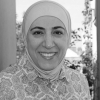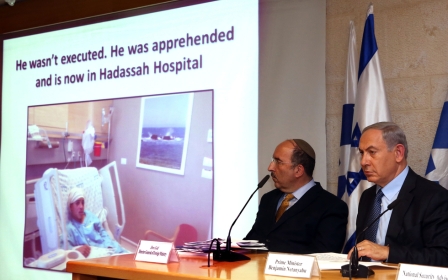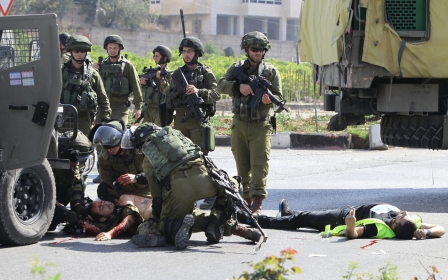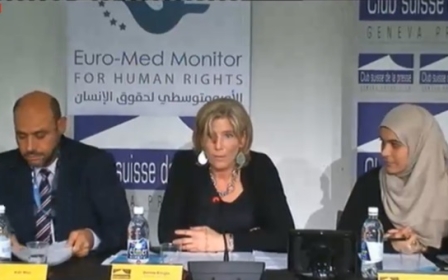There is no father: Palestinian adolescents stand tall for liberation
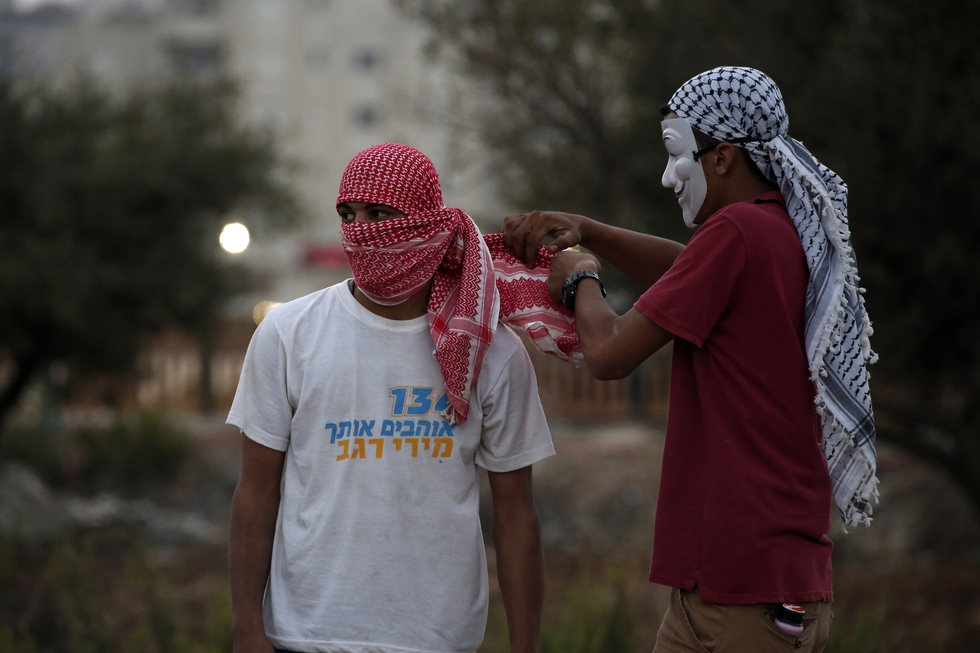
The self-inspired and improvised participation of adolescents who have no political affiliation is a remarkable phenomenon in this current uprising. These are the minors who were born after the Oslo Accords and watched at a distance the three wars upon Gaza, who witnessed the settlers' growing viciousness against our villagers in the West Bank, and who now see clearly the Israeli expansion currently taking over all that is Palestinian in Jerusalem.
These boys are neither desperate nor suicidal, nor are they delinquent and immoral offenders. On the contrary, the biographies of many of them display an ambitious striving for excellence and achievement. They perceive themselves as capable, altruistic and protective of the Palestinian people - and are willing to endure extreme sacrifices to realise these goals.
Ahmad Manasra, 13, was injured by Israelis and was left to bleed on the light train railway, accompanied by obscene shouts by Israeli by-passers to "give him a bullet in the head," in retaliation for accusations that he stabbed an Israeli youth. This youngster was a student at Al Nayzak, enrolled in an extra-curricular programme for students talented in science, technology, engineering and maths.
Mustafa Al Khatib, 17, was a popular and distinguished student at the Al Ibrahimeyeh School. But the childhoods of these children are completely unacknowledged by the Israelis, whose media report one day following the event was entitled: "13 year old terrorist stabbed a 13 old boy."
I do not seek to encourage violence, but I am driven to understand and to explain its origins and to call for an adult response to it. Adolescence is a developmental phase normally characterised by impulsivity, emotional liability and a search for identity. Our adolescents don’t pass through this phase peacefully however. “We will take you to room Number Four. Do you know what that is? You enter it on two legs but come out on all fours.”
This testimony has been reported frequently following the Israeli interrogation of minors in the Russian compound in Jerusalem over recent years - well before the current clashes. This is the Israelis' strategic goal for Palestinians living under occupation, to objectify and exploit them as animals on all fours, gazing at the ground, who do not dare to stand up for their rights. “The only good Arab is a dead Arab” is a slogan often repeated by Israelis expressing the majority’s sentiments towards Palestinians.
Today we are seeing these “dead Arabs” and these “Palestinians on all fours” stand up against the enduring violation and intimidation of their people and attack their oppressor with primitive weapons. In so doing, they reassert in extreme form that they have will and agency, that they are capable of making choices, and that they are willing to risk a likely death by standing up to the enemy. What they are not willing to do is to live "on all fours".
Over the years, the occupation has undermined the structure of Palestinian families and disorganised its community. Palestinian fathers are weakened, unable to provide for their families or to protect them from injury. Eighty percent of Jerusalem residents live below the poverty line, in inadequate and unhealthy housing, with a "temporary residency" status that can be revoked for the slightest perceived defiance of the occupation. Drug addiction is a growing problem. There are dramatically visible discrepancies in life-style and opportunities between East and West Jerusalem. The more they breathe freely in West Jerusalem, they more we choke in East Jerusalem.
Many of Palestinian fathers were killed or made psychologically absent by imprisonment or the trauma of torture; one third of all Palestinian men have been in Israeli detention at one time or another since 1967. Many of these fathers, released after long years in prison, have become shadows of their previous selves. These fathers observe their eldest sons, although in fact mere adolescents, have become "the father" in their place.
Helpless fathers
Our children often experience the arrest of a child in their home. They behold their fathers standing helpless as the masked Israeli soldiers burst in with their military dogs, shouting at the family in Hebrew as a young sibling is snatched from his bed. In some cases, the fathers were forced to hand over their children to the soldiers while swallowing their tears. They witnessed their mothers beaten, humiliated and undressed when they too tried to defend their children and saw their paralysed father unable to protect her. Falah Abu Maria, from Beit Ummar, was killed when he tried to defend his son from soldiers in July.
In addition, these children have only experienced an abusive and unsuccessful Palestinian leadership. After the Palestinian parliamentary elections in 2006, the Palestinian president rationalised the rejection of its outcome by saying “if we have to choose between bread and democracy, we choose bread.” Just before last summer’s war in Gaza, this president informed the Palestinians that "security coordination with Israel is sacred”. And recently, at the opening session of the Palestinian National Council, he made the outrageous assertion: “We have nothing to do with Jerusalem, the Prophet has left Mecca.” The Palestinian leadership has permitted the suffocating siege in Gaza and worked in coordination with Egypt and Israel to flood the tunnels around it. Recently the Palestinian leadership has arrested every Palestinian who possesses the potential to stand up to settlers in the West Bank and has brutally repressed peaceful demonstrations opposing the Israeli attacks on the Al Aqsa mosque.
Israel has deliberately attacked and discredited anyone who might play the role of a positive father figure in the eyes of Palestinians. Many Palestinian leaders have been simply assassinated by Israeli forces; the Palestinian minister Zeyad Abu Ein died in violent confrontation with soldiers; a Palestinian judge was killed at a checkpoint under disputed circumstances, and the entire Israeli Arab leadership is intimidated and threatened with expulsion. Israel has detained dozens of members of the Palestinian Legislative Council and has gone so far as to propose body searches of Arab Knesset members before they enter the Knesset in order to further debase the image of the Palestinian leadership.
Palestinian adolescents know very well that they have an extremely limited personal future under occupation, with its forced imposition of desperate economic, political, and social conditions. But it is the promise of "the future" that helps developing children and youths postpone their natural impulsiveness and submit to the guidance of their parents. Foreseeing nothing but their wasted potential ahead of them, Palestinian adolescents are robbed of the incentives to rein in the age-appropriate recklessness and impulsiveness of adolescence. Perceiving themselves as having nothing to lose and no one upon whom to model themselves, they are vulnerable to a concrete identification with the massive trauma, violence, bereavement, and death all around them.
The occupation with its shattered dreams both magnifies and masks all other forms of adolescent aspiration and adolescent suffering. The violent involvement in resistance to the occupation among these youths is a symptom of the disorganisation of the society in which they are struggling to survive. And Palestinian adults, often having succumbed to humiliation, fear and learned helplessness, have failed to meet these fearless but fatherless children half way; we have left behind a void by failing to rise to the challenge of our responsibilities.
The confrontation between the occupied and the occupier is the natural outcome of the Palestinian reality - far more so than the typical official false submission to the Israelis punctuated by occasional outbursts against them. Our leadership has failed to set an agenda and a national strategy for liberation; it has avoided and feared the process of raising Palestinian awareness and prohibited the development of both authentic discourse and the provision of genuine tools for liberation.
Our leadership has failed to promote education as a vehicle for our dignity and neglected the task of healing the trauma of humiliation. Instead, our leaders have encouraged factional chauvinism, polarisation, corruption and nepotism, and distributed favours on the basis of compliance and political affiliation.
The acts of our youth express a valid and legitimate yearning for freedom and dignity, but this yearning needs our support and nurturing. We must protect our youth from a recklessness that can abort their lives and their goal - as will happen in the absence of the positive boundaries, limit-setting, and social values that fatherly leadership provides.
The spontaneous reaction of our children to the occupation should be a warning of the need for fundamental political reform in Palestine, alerting us to the need to survive as individuals and to thrive as a nation. Their actions should be a wake-up call for us as adults, a catalyst to organise a truly meaningful project to end the occupation.
-Samah Jabr is a Jerusalemite psychiatrist and psychotherapist who cares about the wellbeing of her community – beyond issues of mental illness.
The views expressed in this article belong to the author and do not necessarily reflect the editorial policy of Middle East Eye.
Photo: A Palestinian youth helps another put on a scarf during clashes with Israeli soldiers close to the illegal Jewish settlement of Bet El, in the occupied West Bank city of Ramallah on 4 October, 2015 (AFP).
New MEE newsletter: Jerusalem Dispatch
Sign up to get the latest insights and analysis on Israel-Palestine, alongside Turkey Unpacked and other MEE newsletters
Middle East Eye delivers independent and unrivalled coverage and analysis of the Middle East, North Africa and beyond. To learn more about republishing this content and the associated fees, please fill out this form. More about MEE can be found here.


